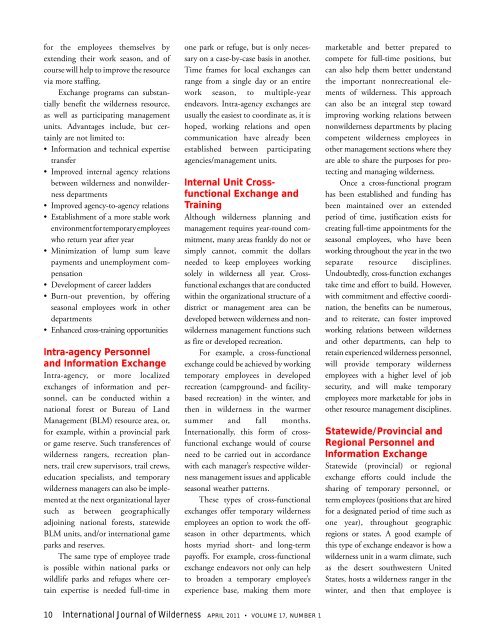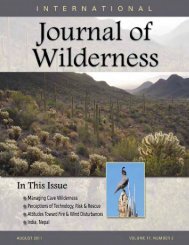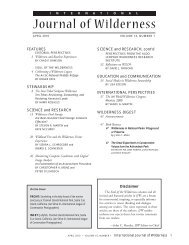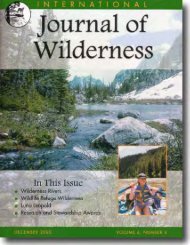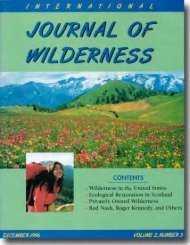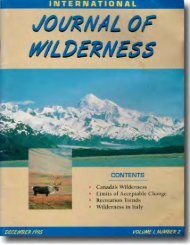Download April 2011 PDF - International Journal of Wilderness
Download April 2011 PDF - International Journal of Wilderness
Download April 2011 PDF - International Journal of Wilderness
You also want an ePaper? Increase the reach of your titles
YUMPU automatically turns print PDFs into web optimized ePapers that Google loves.
for the employees themselves by<br />
extending their work season, and <strong>of</strong><br />
course will help to improve the resource<br />
via more staffing.<br />
Exchange programs can substantially<br />
benefit the wilderness resource,<br />
as well as participating management<br />
units. Advantages include, but certainly<br />
are not limited to:<br />
• Information and technical expertise<br />
transfer<br />
• Improved internal agency relations<br />
between wilderness and nonwilderness<br />
departments<br />
• Improved agency-to-agency relations<br />
• Establishment <strong>of</strong> a more stable work<br />
environment for temporary employees<br />
who return year after year<br />
• Minimization <strong>of</strong> lump sum leave<br />
payments and unemployment compensation<br />
• Development <strong>of</strong> career ladders<br />
• Burn-out prevention, by <strong>of</strong>fering<br />
seasonal employees work in other<br />
departments<br />
• Enhanced cross-training opportunities<br />
Intra-agency Personnel<br />
and Information Exchange<br />
Intra-agency, or more localized<br />
exchanges <strong>of</strong> information and personnel,<br />
can be conducted within a<br />
national forest or Bureau <strong>of</strong> Land<br />
Management (BLM) resource area, or,<br />
for example, within a provincial park<br />
or game reserve. Such transferences <strong>of</strong><br />
wilderness rangers, recreation planners,<br />
trail crew supervisors, trail crews,<br />
education specialists, and temporary<br />
wilderness managers can also be implemented<br />
at the next organizational layer<br />
such as between geographically<br />
adjoining national forests, statewide<br />
BLM units, and/or international game<br />
parks and reserves.<br />
The same type <strong>of</strong> employee trade<br />
is possible within national parks or<br />
wildlife parks and refuges where certain<br />
expertise is needed full-time in<br />
one park or refuge, but is only necessary<br />
on a case-by-case basis in another.<br />
Time frames for local exchanges can<br />
range from a single day or an entire<br />
work season, to multiple-year<br />
endeavors. Intra-agency exchanges are<br />
usually the easiest to coordinate as, it is<br />
hoped, working relations and open<br />
communication have already been<br />
established between participating<br />
agencies/management units.<br />
Internal Unit Crossfunctional<br />
Exchange and<br />
Training<br />
Although wilderness planning and<br />
management requires year-round commitment,<br />
many areas frankly do not or<br />
simply cannot, commit the dollars<br />
needed to keep employees working<br />
solely in wilderness all year. Crossfunctional<br />
exchanges that are conducted<br />
within the organizational structure <strong>of</strong> a<br />
district or management area can be<br />
developed between wilderness and nonwilderness<br />
management functions such<br />
as fire or developed recreation.<br />
For example, a cross-functional<br />
exchange could be achieved by working<br />
temporary employees in developed<br />
recreation (campground- and facilitybased<br />
recreation) in the winter, and<br />
then in wilderness in the warmer<br />
summer and fall months.<br />
<strong>International</strong>ly, this form <strong>of</strong> crossfunctional<br />
exchange would <strong>of</strong> course<br />
need to be carried out in accordance<br />
with each manager’s respective wilderness<br />
management issues and applicable<br />
seasonal weather patterns.<br />
These types <strong>of</strong> cross-functional<br />
exchanges <strong>of</strong>fer temporary wilderness<br />
employees an option to work the <strong>of</strong>fseason<br />
in other departments, which<br />
hosts myriad short- and long-term<br />
pay<strong>of</strong>fs. For example, cross-functional<br />
exchange endeavors not only can help<br />
to broaden a temporary employee’s<br />
experience base, making them more<br />
10 <strong>International</strong> <strong>Journal</strong> <strong>of</strong> <strong>Wilderness</strong> APRIL <strong>2011</strong> VOLUME 17, NUMBER 1<br />
marketable and better prepared to<br />
compete for full-time positions, but<br />
can also help them better understand<br />
the important nonrecreational elements<br />
<strong>of</strong> wilderness. This approach<br />
can also be an integral step toward<br />
improving working relations between<br />
nonwilderness departments by placing<br />
competent wilderness employees in<br />
other management sections where they<br />
are able to share the purposes for protecting<br />
and managing wilderness.<br />
Once a cross-functional program<br />
has been established and funding has<br />
been maintained over an extended<br />
period <strong>of</strong> time, justification exists for<br />
creating full-time appointments for the<br />
seasonal employees, who have been<br />
working throughout the year in the two<br />
separate resource disciplines.<br />
Undoubtedly, cross-function exchanges<br />
take time and effort to build. However,<br />
with commitment and effective coordination,<br />
the benefits can be numerous,<br />
and to reiterate, can foster improved<br />
working relations between wilderness<br />
and other departments, can help to<br />
retain experienced wilderness personnel,<br />
will provide temporary wilderness<br />
employees with a higher level <strong>of</strong> job<br />
security, and will make temporary<br />
employees more marketable for jobs in<br />
other resource management disciplines.<br />
Statewide/Provincial and<br />
Regional Personnel and<br />
Information Exchange<br />
Statewide (provincial) or regional<br />
exchange efforts could include the<br />
sharing <strong>of</strong> temporary personnel, or<br />
term employees (positions that are hired<br />
for a designated period <strong>of</strong> time such as<br />
one year), throughout geographic<br />
regions or states. A good example <strong>of</strong><br />
this type <strong>of</strong> exchange endeavor is how a<br />
wilderness unit in a warm climate, such<br />
as the desert southwestern United<br />
States, hosts a wilderness ranger in the<br />
winter, and then that employee is


